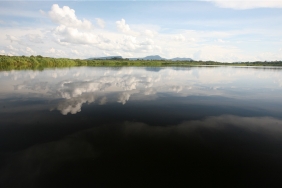ALIKODRA: AN ECOSOPHY APPROACH TO SAVING THE EARTH
The Earth is facing a serious crisis that could threaten the survival of all its inhabitants. Indications are seen through the depletion of natural resource reserves (SDA), while biological resources, both ecosystems and species (flora and fauna), many are lost / destroyed. The situation is exacerbated by environmental pollution such as psoil, air and water pollution. Currently, the rate of degradation of natural resources and the environment is much higher than the rate of human ability to make efforts to improve.
In Indonesia, specifically, efforts to protect and preserve nature have not gone as expected. Damaged and abandoned forest lands to date are estimated at around 30 million ha that have not been reforested. Wetland ecosystems and coral reefs have also been damaged. The government and related stakeholders have not prepared mitigation and adaptation programs for the impact of global warming on natural resources and the environment, including its impact on biodiversity.
The alarming condition as described above has become a concern for Prof. Dr.Ir.. H. Hadi S. Alikodra, MS, who is familiarly called Alikodra. S faculty member of Faculty of Forestry IPB who was once deployed as a bureaucrat in the Office of M Ministeran State of Environment is aware that if the situation is left unchecked, the quality of life of the Indonesian nation will decline, and even its existence will be threatened. With all his knowledge in the realm of natural resource conservation that has been studied, explored, and worked on, in 1998 Alikodra began compiling a book that will be launched on October 24, 2012. The book is entitled "Conservation of Natural Resources and the Environment: An Ecosophy Approach to Save the Earth" published by Gadjah Mada University Press with a thickness of 428 pages is the ultimate hard work of the man born in Cirebon, 64 years ago.
Ciptanti Putri from WWF Indonesia got the chance to chat with the man who has a hobby of reading bbnature conservation-themed and mobserving faalunar phenomenon,especiallyanimal.
.
Ask:
Tanya.
What motivated the preparation of this book?
SI realize that the condition of natural resource reserves on this beloved Indonesian earth is getting depleted and the condition of the environment is getting damaged, on the other hand, the need for natural resources continues to increase, making it more critical to support quality life. However, the Indonesian version of reference books on the conservation of natural resources and the environment is very limited. Beven, which blends it with pthe understanding of Ecosophy is completely absent, so this book is the first. In addition, my educational background and career in the field of natural resource conservation and the environment became strong capital and motivation for me to immediately complete this book.
Question:
What efforts are being made by the government to repair the damage and further preserve Indonesia's natural resources? Where is the role of "NGOs"?
Answer:
The Indonesian government implements conservation strategies and efforts to achieve sustainable development goals, through programs to protect, conserve, and use natural resources wisely. The government issued various laws and regulations for the implementation of environmentally sound natural resource management, such as the Environmental Management Law, and sectoral laws, for example on forestry, mining, marine and fisheries. The government also developed technical tools for implementing natural resource conservation, such as green economy, ecosystem-based spatial planning, improving human resource capacity, and developing collaborative management for conservation areas.
The role of NGOs themselves, as civil society, is to oversee the implementation of conservation strategies/implementation of environmentally sound development, maintain and minimize the negative impacts of development on natural resources, including Kehati resources.
Question:
Which vulnerable points need attention in the conservation of natural resources in Indonesia?
Answer:
Natural resource management is still oriented towards short-term economic benefits that ignore long-term ecological impacts on natural resources, humans and the environment. Meanwhile, the human resource capacity of conservation organizers, legal certainty, and community participation are still low. These two things must be improved and developed continuously.
Question:
Measured by the rate of human growth and the availability of natural resources in Indonesia to support their survival, if we do not take action to conserve natural resources, in what year is it estimated that we will completely lose natural resources?
Answer:
Overall we will lose natural resources in the next 20-30 years if human behavior and policies in Indonesia are not pro-conservation. However, tis highly dependent on the type and nature of the natural resource. Mfor example, for fuel oil,is calculated to be only safe for about 10 years if theconsumption pattern is like today. Uthereforeisneedtodevelopialternative sources of energy from non-fossil fuels. For forest resources, the government with the support of all stake-holders should implement a moratorium on the conversion and exploitation of natural forests and implement forest conservation policies in earnest and in a national movement.
Question:
Is it still possible to improve the condition of natural resources in Indonesia and preserve them for inheritance to the next generation?
Answer:
It is still very possible, at least to extend the expiration. However,the nation must work hard, professionally, and consistently to save and restore natural resources and theu environment appropriately; including activities to save it, study it, and use it wisely.
Question:
In your opinion, what is the simplest but most important and significant action that we-individuals who are members of the general public-can take to help conserve natural resources?
Answer:
Tplant. We can also make lubang-lubang infiltration around the house, to improve infiltration patterns and water management in residential areas, prevent erosion and flooding, as well as garbage pollution in rivers or waterways. The behavior of energy-savingielectricity at home, and using fuel-efficient cars, also need to be developed
.
Question:





